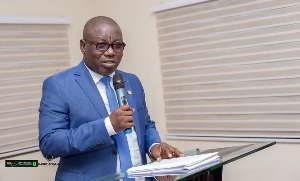Accra (Greater Accra) 28 July '99
The Water Resources Commission (WRC) said on Tuesday that from May 2000, the commission will be the sole body to grant licences and permits for water abstraction.
All existing rights held by other bodies will, therefore, be put off by the period if the holders do not claim such rights.
Professor Dorm Adzobu, Chairman of the WRC, said at the meet-the-press series in Accra that Act 522 of 1996 that established the commission empowers it to grant licences and permits for water abstraction, even though other bodies already have such rights.
"On existing rights, the act provides for a 12-month transition period within which a claimant should submit such right to the commission.
"After the said 12 months, existing rights which are not claimed shall be extinguished," Prof. Adzobu said.
WRC, mainly responsible for the regulation and management of the utilisation of water resources, and for the co-ordination of policy in relation to water uses, is represented by diverse water usage institutions.
Prof. Adzobu said the interests of such bodies would be protected to ensure sustainable water supply and management.
He said the primary tasks of the Commission are related to the allocation of water resources among various competing users.
This, he said, would be reflected in an integrated water policy under consideration. If adopted, it would facilitate the co-ordination of various sub-sectors.
The policy will aim at the conservation of the water resources endowment of the country through its management and utilisation on a sustainable basis.
"This is to ensure that the socio-economic development of Ghana is not constrained at any time by the limited water resources," Prof. Adzobu said.
Dr. Daniel Adom, a member of the Commission, said water resources management should be approached from a sectoral perspective and called for the setting up of a bilateral river-based body to co-ordinate activities on shared water resources.
He said the development aspirations of African countries could be hard hit if the major challenges of effectively managing the water resources of the countries are not taken up seriously.
He noted that a substantial number of African countries do not have adequate national water policies, legislative and regulatory frameworks or systems for inter-sectoral co-ordination.
General News of Wednesday, 28 July 1999
Source: --












